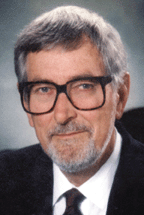Former Dean Roger Eichhorn is retiring from the University of Houston Cullen College of Engineering faculty in August, leaving behind a legacy of academic and administrative achievement--and many devoted friends and colleagues.
Under Eichhorn's leadership, the college raised student admissions standards, elevated the quality of the faculty, and greatly expanded the college's public identity and community presence.
Professor Charles Dalton, who served as associate dean for undergraduate programs early in Eichhorn's term as dean, credits Eichhorn with prompting an increase in the admissions standards for first-year students and transfer students. "He encouraged faculty to increase the admissions standards, and the SAT and ACT scores that we required went up," Dalton says.
Despite facing a national downward trend in enrollments--and the budget restraints that followed--Eichhorn spurred efforts to continue to recruit highly credentialed faculty. "The quality of the people we looked for as potential faculty continued to improve," says Dalton, "and as a result we kept getting people who had more and better potential to be successful faculty members."
Perhaps the most obvious of Eichhorn's accomplishments as dean were the ones that helped shape a strong community presence and public identity for the college. During his tenure, the Engineering Alumni Association worked with Dion McInnis, former director of external relations, to initiate several annual events that are still successful today, events such as the Distinguished Engineering Alumni Awards Dinner, the ASME/UH Cajun Crawfish Boil, and the Engineering Golf Tournament.
These activities draw thousands of participants every year, place the college in the public spotlight and have raised hundreds of thousands of dollars for scholarships and research.
"He was very influential in getting the engineering alumni organization up and running, enhancing the college's role with its industry partners," says Vita Como, senior director of development.
Professor David Shattuck, who also served as associate dean of undergraduate programs, echoes that refrain. "I think the alumni organization took off because Roger decided that was important. Of course, without good alumni it couldn't happen either. But Roger was the one who engineered the conditions that made the alumni organization take off."
The initial thrust for an invigorated engineering alumni group came in the mid 1980s, when Ray Meyer (1973 BSCE, 1978 MSCE) and Rafael Ortega (1981 BSCE, 1985 MBA) approached Eichhorn about starting a Civil Engineering Alumni Association. Eichhorn told them that he would much rather have only one association for the entire college, so they concentrated their efforts on promoting the Engineering Alumni Association, which has grown into the largest on campus. Through the years that followed, the number of active dues-paying members in the EAA grew from 85 to nearly 1,200.
Eichhorn is also widely praised by his colleagues for his insistence on holding to high standards, especially when faced with difficult decisions.
"I think Roger fostered an attitude of quality in the college," says Dalton. "He has high standards and I think he expected others to have high standards."
Shattuck agrees: "To me, one of the key descriptors of Roger is that he was always principled. I served as associate dean for five and half years under Roger, and whenever we dealt with a problem, if there was an expedient way out he would never take it. He always worked from principles."
Eichhorn launched two new administrative offices--external relations and development--and infused the college's administration with outstanding new personnel. Shattuck counts the hiring of some of those administrators among Eichhorn's many accomplishments.
"One of the key things that I think he did was to bring in Vita Como," Shattuck says. "I think most faculty have no idea of all the things that Vita does, but she made and continues to make a huge number of things happen for the good of the college. He also brought in Dorothy Berrera as the college's business administrator, and I think Dorothy has done a superbly good job."
Some other key facts about Eichhorn's term as dean:
- John Lienhard, M.D. Anderson Professor of Technology and Culture, develops the nationally syndicated radio program, the Engines of Our Ingenuity, in response to Eichhorn's request for a radio program to promote the college
- College hits historical peak in student enrollment at 3,835 in 1983
- College's highly regarded Program for Mastery in Engineering Studies (PROMES, formerly known as the Program for Minority Engineering Students) expands from 85 students in 1982 to 311 students in 1996
- Student body becomes more diverse as percentages double for Asian American, Hispanic, international and female students
- College hits historic peak of more than $10 million in research awards in 1994, a level the college has only now begun to approach again
After stepping down as dean in 1996, Eichhorn joined the faculty in the Department of Mechanical Engineering, where he taught several core undergraduate courses and made an impact on the curriculum, particularly on a junior year undergraduate lab, MECE 3360 Experimental Methods. He restructured the course so that other faculty members could teach it more easily.
Eichhorn earned a reputation among the students as a tough, but fair, professor. In 1998, the UH ASME Student Chapter named him Professor of the Year.
"Not everybody likes to teach experimental methods," says Dalton. "Roger agreed to teach it and I think he's done a outstanding job. He reorganized the course in a more meaningful way and the students have really responded to it. He's been a very positive contributor to the department and he'll be missed."
A former faculty member at Princeton, Eichhorn came to UH from the University of Kentucky, where he had also served as dean. He holds the rank of Life Fellow of the American Society of Mechanical Engineers (ASME) and Fellow in the American Association for the Advancement of Science.
Before shifting his career focus to administrative positions, Eichhorn had been an acclaimed researcher whose work earned him the distinction of the 1982 Memorial Award for Heat Transfer Science from the ASME.
